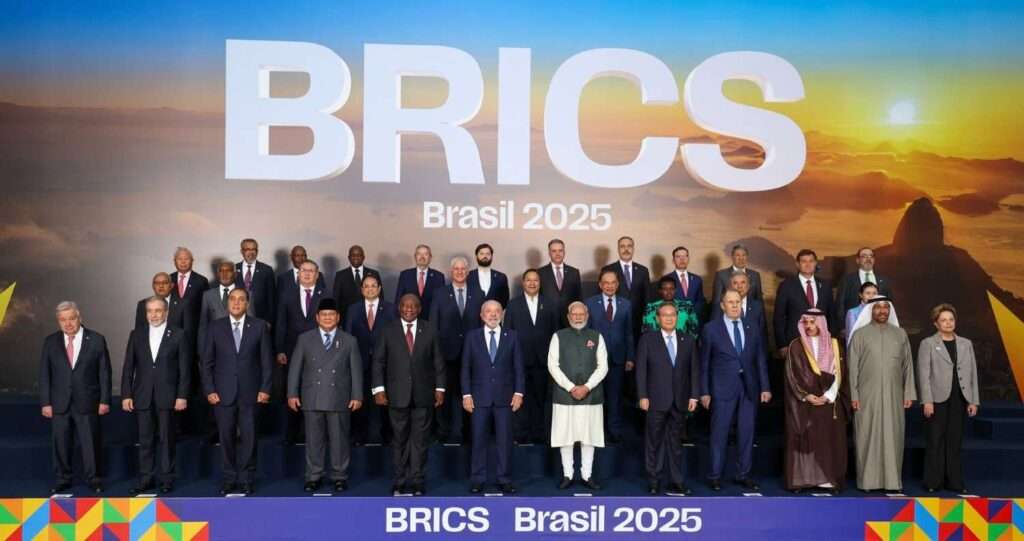The recent visit to Brazil by Indian Prime Minister Narendra Modi from July 6 to July 8, 2025, is an important milestone in the diplomatic relationship between India and Brazil. The Prime Minister Narendra Modi attended the 17th BRICS Summit in Rio de Janeiro and then paid a historic state visit to Brasília. This visit highlighted the expanding global influence of India and the growing commitment to foster cooperation with the largest democracy in Latin America.
BRICS Summit 2025: A Platform for Global Leadership
The BRICS Summit in Rio de Janeiro, July 6-7, 2025, brought together leaders from Brazil, Russia, India, China, and South Africa to cover the world’s most urgent challenges, including climate change, global health, terrorism, and the reform of multilateral trade systems. During the summit, PM Modi used the opportunity to reaffirm India’s position against terrorism, urging other countries to publicly condemn terrorist acts without hesitation.
In his keynote presentation during the plenary on “Environment, COP-30 and Global Health,” Modi indicated that climate justice is a moral necessity for the global South. In outlining the climate change process, he reinforced that as far as India is concerned, it is not an option to deal with climate change; it is a responsibility based on civilizational values and development objectives.
India also confirmed its commitment to bolstering the New Development Bank and the BRICS Contingent Reserve Arrangement while signalling its eagerness to work and collaborate with other countries to advance cooperation in digital public infrastructure and resilient supply chains, all of which were particularly important to his own government when it comes to the digital economy. With Modi’s leadership at the summit, India demonstrated that it was a key player for a more inclusive and legitimate global governance.
BRICS Enlargement and Evolving Global Role
In 2024, BRICS had some significant expansion of its membership, with Indonesia being welcomed as a full member and Nigeria as a partner, demonstrating BRICS’ ensured position of global importance while speaking terms of state. The bloc of nations collectively accounts for 46% of global gross domestic product and 55% of global population. The following are some of the salient events relating to the BRICS countries led by Russia, known as the Kazan summit, which is colloquially referred to as the “Putin show,” bringing together new BRICS members from Africa and the Arab world – Egypt, Ethiopia, Iran, and the United Arab Emirates. Many additional nations have expressed interest in becoming new members, BRICS has founded itself as a geostrategic and economic powerhouse, or the “substantial” geopolitical reality today complicating issues, within the context of growing tensions with the United States, fragmenting global powers.
Historic State Visit: First in 57 Years
After attending the BRICS meetings, PM Modi undertook a state visit to Brasília on July 8; it was the first such Indian prime ministerial visit in almost sixty years. President Luiz Inácio Lula da Silva of Brazil received him, with all possible ceremonial pomp, including, among other things, a Samba Reggae welcome and a state dinner in his honour. The visit highlighted the historic and strategic character of India-Brazil relations. Both countries are members of BRICS and G20, share democratic values, have cultural affinities, and have mutual interest in energy, agriculture, defence, and technology.
Four MOUs Signed: Expanding Strategic Partnership
A key outcome of the bilateral discussions was the signing of four Memorandums of Understanding (MoUs):
- Counter-Terrorism Cooperation: Commitments to further collaboration and cooperation between governments in response to terrorism through intelligence and joint initiatives.
- Confidential Information Sharing: A MOU was signed to share sensitive information securely and with government concurrence.
- Renewable Energy Cooperation: This MOU lays the foundation for developing clean energy projects through collaboration, particularly in areas of solar and biofuels.
- Agricultural Research Collaboration: The Indian Council of Agricultural Research (ICAR) and Embrapa (Brazilian Agriculture Research Corporation) agreed to collaborate on the innovation of agriculture innovation techniques and sustainability.
These agreements signify a further deepening of trust and intent between the two countries to jointly respond to the 21st-century challenges going forward.
Strategic and Economic Significance
The PM’s visit to Brazil will represent both a symbolic and a practical significance. Symbolically, this is India’s re-engagement with Latin America after decades of missed Head-of-State level relationships; practically, it opens new paths along South-South cooperation, primarily in the areas of energy security, food security, defence and counter-terrorism. Canadians and Brazilians share a long-standing commitment to reforming multilateral institutions, such as the United Nations Security Council, and the World Trade Organization, which contributes to the long-term strategic alignment of India and Brazil.
Conclusion
PM Modi’s visit to Brazil has not only deepened India’s engagement in BRICS but has transformed the nature of India-Brazil relations. As two lively democracies and economies in transition, their strengthened relationship is a potential means to shape a more equitable and inclusive international order. From Rio to Brasília, this diplomatic outreach holds the promise of a future that producers of mutual respect, shared interests, and a common vision for sustainable development.

